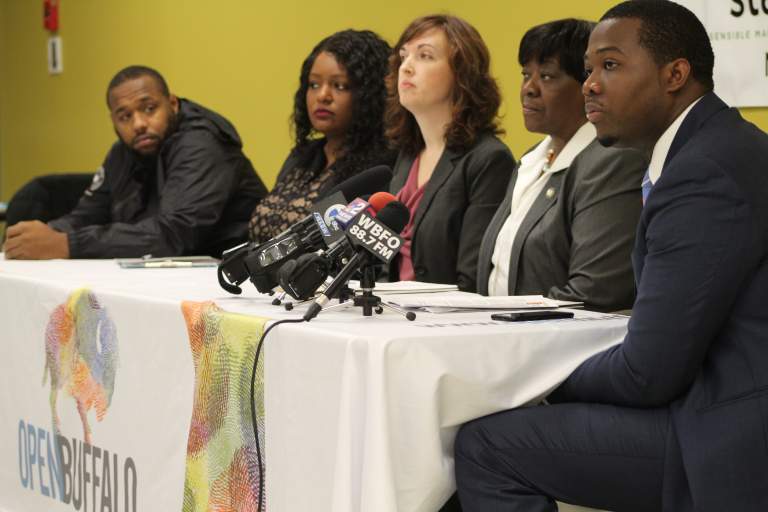
Justice & Opportunity
For Immediate Release: Buffalo Advocates Join Assemblymember to Call for an End to Marijuana Prohibition in New York
Published November 14, 2017
Partnership for the Public Good
Open Buffalo
Assm. Crystal Peoples-Stokes
Drug Policy Alliance
www.drugpolicy.org
For Immediate Release:
November 14, 2017
Contact: Tony Newman (646) 335-5384; Chris Alexander (646) 701-2256
Buffalo, NY — Today, the Partnership for the Public Good, a Buffalo community-based think tank, introduced a report highlighting marijuana arrest disparities in Buffalo, New York. The report, Advancing Racial Equity and Public Health: Smarter Marijuana Laws in Western New York, reveals the city of Buffalo’s marijuana policing practices to be as pervasive as the practices witnessed in New York City in their targeting of low-income communities of color.
The report analyzed marijuana arrest data and the populations most impacted by the enforcement of marijuana prohibition and found that, similar to New York City, those being arrested for low-level marijuana possession in Buffalo were largely young people and largely people of color.
“In the last five years, people of color made up 77 percent of marijuana possession arrests in Erie County, though they make up just 18 percent of the population,” said Andrea Ó Súilleabháin of the Partnership for the Public Good.
“We know that young people of color use marijuana at slightly lower rates than white people, so this disparity cannot be explained by use. This is one local result of the war on drugs, which has tended to target low-level offenses in non-white, low-income communities,” continued Andrea Ó Súilleabháin. “This unequal enforcement of marijuana prohibition comes at a high cost for communities of color.”
Advocates in the criminal justice field from across the state have pushed for the decriminalization of low-level marijuana possession for years citing the racially disproportionate enforcement and the devastating collateral consequences that can accompany a marijuana arrest or conviction.
“Despite the fact that NY has decriminalized possessing small amounts of marijuana, hundreds of people are arrested for it every year in Buffalo. Even if they do not go to jail, the charges can be devastating to their prospects for jobs, loans, student aid, housing, benefits and child custody,” said Rebecca Town of the Legal Aid Bureau of Buffalo. “The arrests also create a huge financial burden between the court fees, fines, and co-pays for substance abuse counseling. Not to mention time away from work or school and childcare costs required for court appearances and counseling.”
Buffalo Assemblymember Crystal Peoples-Stokes was joined by national and local organizations as she called on New York State to follow the example of California, Colorado, and other jurisdictions by ending marijuana prohibition and creating a system to tax and regulate marijuana.
“Communities of color have been on the frontlines of the failed war on drugs, bearing the heaviest burden in arrests, incarceration and ultimately exclusion in economic opportunities. New York State has made steps on reforming draconian mandatory minimum sentencing however, this tough on crime approach for low level possession and nonviolent offences has to stop. We are stifling economic opportunity for all, and breaking apart families. Open Buffalo and allies are working on a local level to repair relationships between law enforcement and communities however, state action is needed to untie the hands of law enforcement,” said Franchelle Parker of Open Buffalo.
Eight states and the District of Columbia have now ended marijuana prohibition and instituted policies to tax and regulate marijuana -- moving oversight of marijuana policies from the criminal justice system to regulatory bodies. Data from those states on trends in use and public safety show that marijuana legalization has had no discernible negative impact. And most importantly, people are no longer being confronted daily with the threat of criminalization because of their use.
Assemblymember Peoples-Stokes has been a leading voice in the New York State Legislature on marijuana reform since 2013 when she introduced the Marijuana Regulation and Taxation Act, a bill that would legalize the production, distribution, and use of marijuana for adults over the age of 21. The bill would effectively end marijuana prohibition in New York State and would create a system to tax and regulate marijuana in a manner similar to alcohol.
“Historical data shows that minorities and whites use marijuana at roughly the same rate, but blacks and Latinos are almost four times more likely to be arrested for pot. This criminal record follows them, as they can be discriminated against for employment, housing, and access to education and public benefits, and they're essentially locked into a second-class status for life. This legislation works towards the prevention of a criminal record to afford young adults basic opportunities that they would otherwise never have available to them.” Assemblywoman Crystal D. Peoples-Stokes.
The MRTA legislation is currently being supported by a statewide campaign, of which Buffalo advocates Partnership for the Public Good and Open Buffalo are coalition partners. The campaign, Start SMART NY is dedicated to ending senseless marijuana arrests and citations, creating a public dialogue on collateral consequences and the hyper criminalization of communities, transforming stigma, and building economic power.
“As states across the country continue to re-envision their marijuana policies, it is imperative that New York and New Yorkers also engage in a thorough review of the efficacy of marijuana prohibition. We have watched as other states have been able to re-direct state resources from criminalizing this low-level offense to developing communities. We think this is a sensible response to the problem of marijuana arrests and that it is time that we end the marijuana arrest crusades being waged from Buffalo to Brooklyn,” said Chris Alexander of the Drug Policy Alliance.
###